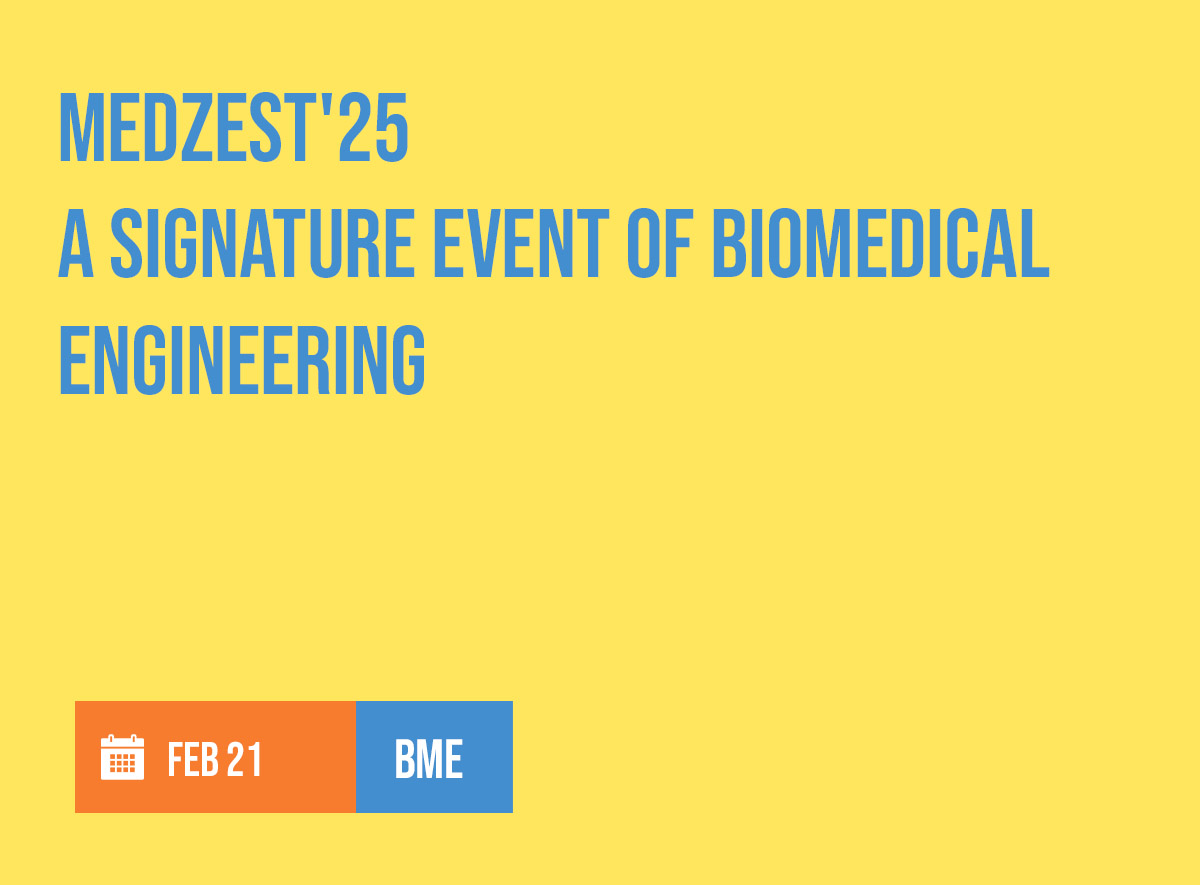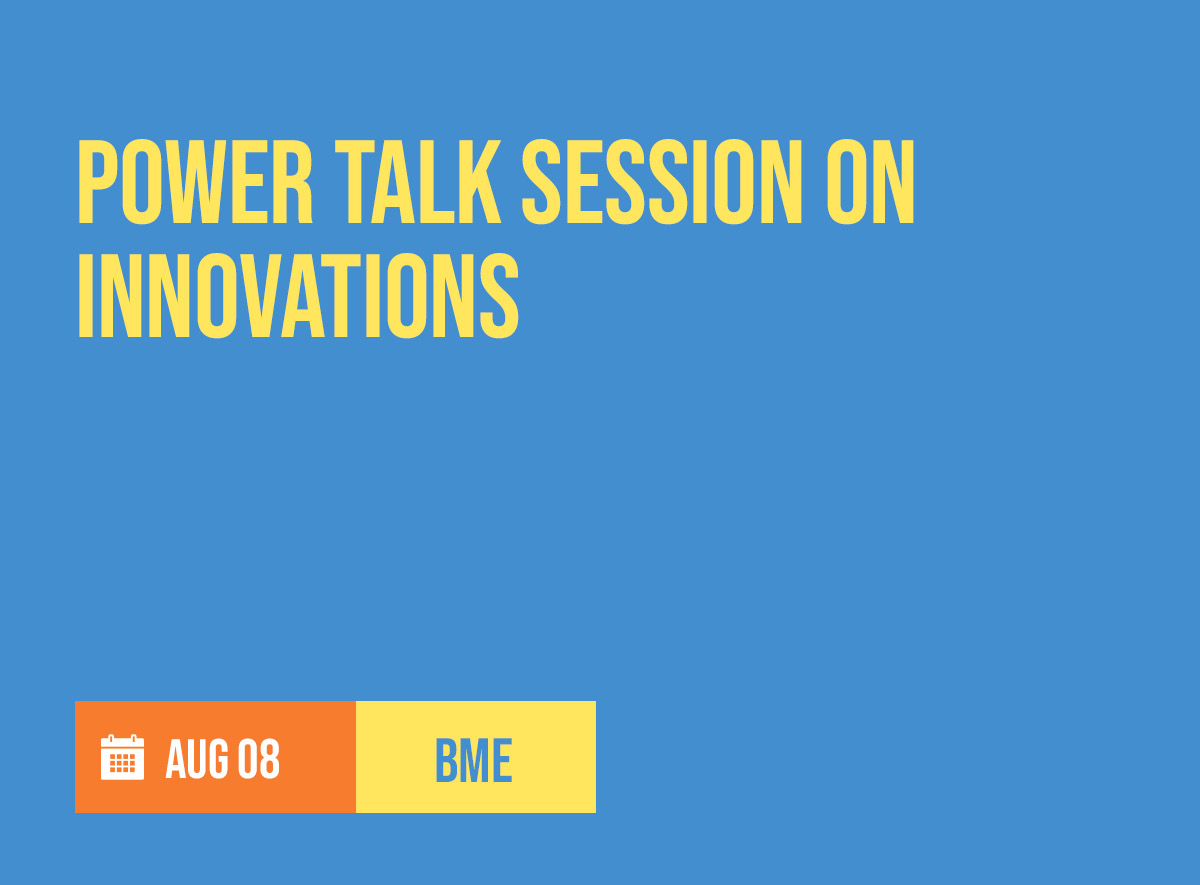What is Biomedical Engineering?
A rapidly growing and ever-evolving field of study, Biomedical Engineering combines engineering and the life sciences in ways that advance scientific discovery, healthcare and medicine, manufacturing and agriculture. Our Biomedical engineering degree will equip you with the skills you need for a career in the evolving world.
Our Biomedical engineering degree will equip you with the skills you need for a career in the evolving world.
Why Study Biomedical at NGPiTECH?
Every student of Biomedical Engineering at Dr.N.G.P. Institute of Institute of Technology will have the opportunity to learn real time at one of the finest and most respected hospitals in India - Kovai Medical Center and Hospital. Most of your practical classes will be conducted in the realtime laboratories at KMCH. Would you need a better reason to study Biomedical at NGP-iTech than this?
Learn more about the future of Biomedical engineering and its Impact in the 21st century Learn More
Learning is Realtime
Our Biomedical degree has a strong industry connection with Kovai Medical Center and Hospital and KMCH institute of Health Sciences and Research.
What you will study
Biomedical engineering students commonly focus on a single engineering discipline with a significant area of application in the biology/life sciences or a specific field of medicine. Below are some primary areas which comprise contemporary Biomedical engineering:
- Biomedical Nanotechnology
- Bio Fluid Dynamics
- Drug Delivery
- Functional Genomics
- Biomaterials
- Medical Technology
- Integrated Systems, and Analysis Tools
- Imaging Instrumentation and Patient Monitoring
- Medical Robotics
- Informatics and Computational Methods
- Medical Implants
- Sensors and Devices
- Rehabilitation and Prostheses Cell and Tissue Engineering
- Telehealth Technologies
- Data Science and Predictive Health Analytics
A Biomedical engineering graduate from NGPiTech will be proficient in problem definition, applied sciences, mathematics and engineering principles to provide solutions to problems. Our students also get extensive skills and ability to effectively communicate with coworkers, peers, supervisors, healthcare professionals, clients, and more.
Department Information's
About Department
The department of Biomedical Engineering was established in the year 2012. The students are given hands-on clinical training in the Kovai Medical Center and Hospital. This is a multi disciplinary, super specialty hospital with a wide facility of state of the art medical equipment. Students have excellent exposure to a wide range of equipment in all the departments of hospital. The department constitutes skilled faculty professionals with high academic records. Biochemistry & Human Physiology Laboratory, Pathology and Microbiology Laboratory, Biomedical Instrumentation Laboratory, Digital Signal Processing Laboratory, Diagnostic and Therapeutic Equipment laboratory were constructed with higher end laboratory equipment and best infrastructure facilities which influences the learning abilities of the students. The department has regular interactions with Kovai Medical Centre and Hospital, Biomedical companies for training, internship, projects and research in the emerging fields of Biomedical Engineering. Apart from the regular curriculum and clinical program the knowledge of students are enriched by special lecture series by eminent doctors from the hospital and they learn skills of usage, service and repair of the medical equipment in the hospital. Industry tie-up with SIEMENS Healthineers, Helix corporation, TMI Systems, GETINGE, National Instruments & Texas Instruments for Industrial Trainings and Projects, Internship with Stipend. The Department of BME received the Best Industry Institution Collaboration Award from SEEE. International University tie-up with Florida Atlantic University – USA, Universiti Teknologi Petronas, Malaysia, University of Wisconsin-Lacrosse, USA and Lincoln University College, Malaysia for research attachment program and Internship.
Vision
To produce quality Biomedical engineers with strong technical knowledge and excellence in engineering design for providing solutions to healthcare problems.
Mission
The stated vision of the Department of Biomedical Engineering will be achieved by:
- Integrating engineering and life sciences for the development of innovative Biomedical products.
- Imparting quality education through innovative Teaching - Learning methodologies.
- Collaborating with healthcare industries for education, training, research and development.
- Establishing state-of-the-art facilities to enhance the technical skills.
- Providing sustainable solutions for challenges in global healthcare with ethical, social and moral values.
Short Term Goals
- To Train the students with advanced technologies & tools related to Health care.
- To conduct more curriculum enrichment programs with a support of industries and high performing institutions to make the students more competent
- To establish the centre for product development to address societal needs
Long Term Goals
- To impart knowledge, develop attitude and inculcate skills and values.
- To produce competent Biomedical Engineers to serve the needs of the society
- To build a conducive environment for learning and to carry out research in the area of medical technology
Program Educational Objectives (PEOs)
The graduates of B.E. Biomedical Engineering programme will:
- Graduates will apply fundamental principles of biomedical engineering to design, develop, and implement innovative solutions that improve healthcare outcomes. They will demonstrate technical proficiency in areas such as medical devices, biomaterials, and biomechanics, contributing effectively to interdisciplinary teams and projects.
- Graduates will conduct their professional activities with a strong ethical framework and a commitment to social responsibility. They will consider the implications of their work on patient safety, healthcare equity, and the environment, ensuring that their solutions are both effective and respectful of ethical standards.
- Graduates will excel in communicating complex biomedical engineering concepts and solutions to a diverse audience, including healthcare professionals, patients, and other stakeholders. They will work effectively in multidisciplinary teams, demonstrating leadership and collaboration to achieve common goals in healthcare innovation and practice
- Graduates will engage in continuous professional development and lifelong learning to stay abreast of advances in biomedical engineering. They will pursue further education, certifications, or specialized training to enhance their expertise and adapt to emerging technologies and evolving healthcare needs.
Programme Outcomes(POs)
After the successful completion of B.E programme in Biomedical engineering, students will be able to:
- Engineering Knowledge: Apply the knowledge of mathematics, science, engineering fundamentals, and an engineering specialization to the solution of complex engineering problems.
- Problem Analysis: Identify, formulate, review literature, and analyze complex engineering problems reaching substantiated conclusions using first principles of mathematics, natural sciences and engineering services.
- Design / Development of solutions: Design solutions for complex engineering problems and design system components or processes that meet the specified needs with appropriate consideration for the public health and safety, and the cultural, societal, and environmental considerations.
- Conduct investigations of complex problems: Use research-based knowledge and research methods including design of experiments, analysis and interpretation of data, and synthesis of the information to provide valid conclusions.
- Modern tool usage: Create, select, and apply appropriate techniques, resources, and modern engineering and IT tools including prediction and modeling to complex engineering activities with an understanding of the limitations.
- The engineer and society: Apply reasoning informed by the contextual knowledge to assess societal, health, legal and cultural issues and the consequent responsibilities relevant to the professional engineering practice.
- Environment and sustainability: Understand the impact of the professional engineering solutions in societal and environmental contexts, and demonstrate the knowledge of, and need for sustainable development
- Ethics: Apply ethical principles and commit to professional ethics and responsibilities and norms of the engineering practice.
- Individual and team work: Function effectively as an individual, and as a member or leader in diverse teams, and in multidisciplinary settings.
- Communication: Communicate effectively in complex engineering activities with the engineering community and with society at large, such as, being able to comprehend and write effective reports and design documentation, make effective presentations, and give and receive clear instructions.
- Project management and finance: Demonstrate knowledge and understanding of the engineering and management principles and apply these to one's own work, as a member and leader in a team, to manage projects and in multidisciplinary environments.
- Life-long learning: Recognize the need for, and have the preparation and ability to engage in independent and life-long learning in the broadest context of technological change.
PSO-Program Specific Outcomes
After the successful completion of B.E programme in Biomedical engineering, students will be able to:
- Professional Skills: Design and develop diagnostic and therapeutic devices to support physician for enhancing the quality of life for the end user by applying fundamentals of Biomedical Engineering.
- Problem-Solving Skills: Solve complex Biomedical Engineering problems, using diagnostic and therapeutic equipments and software viz. DICOM Viewer, MIMICS, Bio-Virtual Instrumentation, MATLAB along with analytical skills to arrive cost effective and appropriate solutions for health care issues.
- Social Relevance: Adapt to emerging information and communication technologies (ICT) to innovate ideas and solutions for current societal and scientific issues in healthcare.
Quick links
Faculty Details
| S.No. | Name of the Faculty | Designation | Profile |
|---|---|---|---|
| dr. s. praveen chakkravarthy | Head of the Department | View Profile | |
| j.chitra | Associate Professor | View Profile | |
| dr.s.velmurugan | Associate Professor | View Profile | |
| m nirmala | Associate Professor | View Profile | |
| naveeth kumar r | Assistant Professor (O.G.) | View Profile | |
| k.vishnulakshmi | Assistant Professor (O.G.) | View Profile | |
| dr.r.thiruvengadam | Assistant Professor (O.G.) | View Profile | |
| dr. mothi r | Assistant Professor (O.G.) | View Profile | |
| m.r.mano jemila | Assistant Professor (O.G.) | View Profile | |
| s divya | Assistant Professor (O.G.) | View Profile | |
| r.sundar | Assistant Professor (O.G.) | View Profile | |
| sri roshini r | Assistant Professor (O.G.) | View Profile | |
| dr. t. kannan | Assistant Professor (Sl.Gr.) | View Profile | |
| dr. nedumal pugazhenthi p | Assistant Professor (Sl.Gr.) | View Profile | |
| dr. j. revathi | Assistant Professor (Sl.Gr.) | View Profile | |
| senthilkumar. n | Assistant Professor (Sl.Gr.) | View Profile | |
| t.preetha | Lab Technician | View Profile | |
| p.jegatheswari | Lab Technician | View Profile | |
| arivazhagan m | Lab Technician | View Profile |
Adjunct Faculty Details
| S.No. | Name of the Faculty | Affiliated Industry | Contact |
|---|---|---|---|
| Mr.Boopathi Sakthivel | Founder, CEO & Biomedical Engineer, Prashan Medical Technologies, Coimbatore |
Mobile: +91 8883774112 www.prashanmedtech.com |
Laboratory


Human Physiology Lab

Pathology and Microbiology Lab

Biomedical Instrumentation Lab

Diagnostic and Therapeutic Equipment Lab

Bio Signal and Medical Image Processing lab
Industry Partnerships











Industry Powered Centers and Courses

Center for Medical Equipment Systems
Read more

KMCH Medical Equipment Calibration Center
Read more

Center for Medical Imaging
Read more

Value Added Courses by Industry
Read more
Professional Societies in NGPiTECH
B-MEDIDIANS
The Biomedical Engineering Engineers Students’ Association was the inaugurated in the year 2013 and named as ‘B-MEDIDIANS’. This Association is responsible for organizing Technical events, Workshops, Guest Lectures etc., The Association also played a vital role to form bridge between students and industry by organizing Industrial Visits, Field Visits to understand learning and understand the theoretical concepts. It develops student self analyze, project development, proposal submissions, industry interaction, intern-project collaboration activities.
Biomedical Engineering Society of India (BMESI)
The Biomedical Engineering Society of India (BMESI) is an All India, non-profit making professional learned body. The Headquarters of the BMESI is presently at the Department of Biomedical Engineering, Manipal Institute of Technology, Manipal. The Biomedical Engineering Society of India (BMESI) Students Chapter at Dr.N.G.P. Institute of Technology was established in the year 2014. Through the BMESI Students Chapter, various activities like workshops, seminars, guest lectures, invited talks, and competitions are organized periodically.
Society for Engineering Education Enrichment (SEEE)
Society for Engineering Education Enrichment (SEEE) is a nonprofit organization for the engineering profession in India. SEEE founded in 2016, major challenge by a group of young graduate engineers in India to serve the interests of the individual engineers in India across all the disciplines of engineering. The society looks after the professional needs of members through well structured programmes and regular interactions among the different cadre of membership, enhancing high professional standard and ethical practices.
Indian Biomedical Skill Consortium (IBSC)
The Department of Biomedical Engineering, Dr.N.G.P. Institute of Technology, Coimbatore registered itself as a partner institution with Indian Biomedical Skill Consortium on 13.06.2018. In collaboration with IBSC 11 of our students visited Andhra Pradesh MedTech Zone (AMTZ) which is Asia’s first dedicated Medical Devices Manufacturing Park, spread over an area of 270 acres with 200-250 manufacturing units under development. IBSC has also stepped forward to support our annual workshop “A forum for hands on training and quality control of Medical Equipment” (MedZEST-2019) towards its grand success and has offered to conduct an assessment towards a certification in our premises.

Happenings
Career
Career opportunities
- Healthcare
- Robotics
- Telemedicine
- Pharmaceutical Industry
- Medical Coding
- Government Sectors
- Nanotechnology
- Molecular Science
Internship
Internship
NGPiTech students are provided ample opportunities for full time internships and on-the-Job trainings in reputed companies like Amazon, Capgemini, Bosch, Cognizant Flipkart, Hexaware, IBM, Infineon, ITC Wipro etc. We have pioneered a student engagement model, where student go for internship with the option of a Pre-Placement offer for a period of 6 months to a year. The student simultaneously complete their Academic program as well as the internship and are on board as full-time employees based on their internship performance.
Study With us
Hear from our Alumni
Listen to our alumni talk about their degree and life at Dr. NGP Institute of Technology, Coimbatore.
















